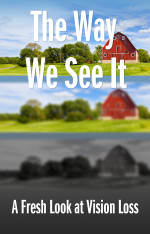
“These are stories of people with impaired vision. They are stories that will open our eyes.” –Warren Hanson author of The Next Place writing about THE WAY WE SEE IT
The first book I published was about hearing loss. No Walls of Stone: An Anthology of Literature by Deaf and Hard of Hearing Writers was a labor of love. The writers I met as I compiled it were some of the most talented, interesting people I’ve ever known. One, Hannah Merker, went on to publish her memoir, Listening, another, Raymond Luczak to edit Jonathan: A Journal of Gay Fiction and another, Willy Conley, to become an award-winning playwright.
Editing No Walls made me aware of the power of narrative to reconcile, restore, and galvanize. To bestow meaning, give voice, and engage community.
Since then, I’ve been fascinated by work that gathers collections of voices with a shared experience, especially when that experience is just a bit beyond the “norm”—something unusual enough to be unfamiliar to most people, but common enough that it might impact anyone at some point in her life.
So, when I learned of a recently published collection of writings exploring vision loss in much the same way hearing loss was addressed in No Walls, I was thrilled. At a reading and discussion, I sat enthralled by the participants’ stories, and couldn’t wait to read the book.
The Way We See It: A Fresh Look at Vision Loss did not disappoint. In its pages, sixty-five authors share their wide-ranging and varied experiences with lost and limited vision.
One of the key messages in The Way We See It is that vision loss isn’t one thing, but a staggeringly diverse collection of conditions and experiences.
The authors range across the age spectrum and include all levels and types of vision loss. Even the cover—the same scene repeatedly shown in decreasing degrees of color and clarity—represents this variety.
A professor of biology—a geneticist—talks about being “unlucky in the genetic lottery” when she inherited a disease that causes progressive vision loss, and her hopes that her sons will be luckier.
An eighty-two year-old great grandmother who lost her vision as a teenager states unequivocally, “If it’s possible to do it, I can do it. There is always something out there you can do.”
A deaf-blind man writes of the frustration he feels when people assume his wife is “Annie Sullivan” to his “Hellen Keller,” when in fact he is an independent person who takes care of himself.
A 12-year-old writer brings an upbeat attitude to his story: “There are two roads to take: one of anger and one of hope. Black or light. While I’m starting to understand black, I choose light.”
These are just a tiny sampling of the sharply written, engaging essays to be found in The Way We See It.
The book treats vision loss with honesty, candor, and wit. The contributors share anger but never rage, grief but never self pity. Vision loss is never sentimentalized in these essays. The challenges and heartache of vision loss are not sugar coated, but they are treated with humor, hope, and determination. The writers never come across as victims.
This is not a book just for people interested in vision loss.
In fact, if you’ve never given the topic much thought, you’re the perfect audience—because this book will come as a revelation, full of fresh insights and ideas.
The Way We See It is simply a good read—often moving, sometimes funny, and always eye opening. It is available in several Twin Cities bookstores and as a downloadable e-book and audiobook at VisionLossResources.org.
I have Multiple Sclerosis and among other areas of the Central Nervous System (brain, spine and optic nerves) that are affected, my vision has been getting progressively worse over the past ten years. I started with just double vision, then it started to get blurry as well, and now I experience both those things, plus my vision is getting worse rather quickly. I have learned to adapt to most of the problems I experience due to my vision loss, although there continues to be more challenges every few months. I am always looking for new ways to adjust and continue living an active life while experiencing this and several other MS symptoms.
Thank you for this wonderful review. I can’t wait to get a copy of the audiobook and listen to how other people who have experienced vision loss have adapted their lives. I work hard to keep a positive outlook and it sounds like this book is going to be a big help in achieving that goal. Thank you again, and thank you to all those who wrote about their experiences.
Thank you for sharing your experience, Denise. I’m sure you will find the book enlightening as well as enjoyable.